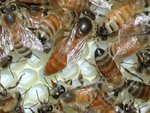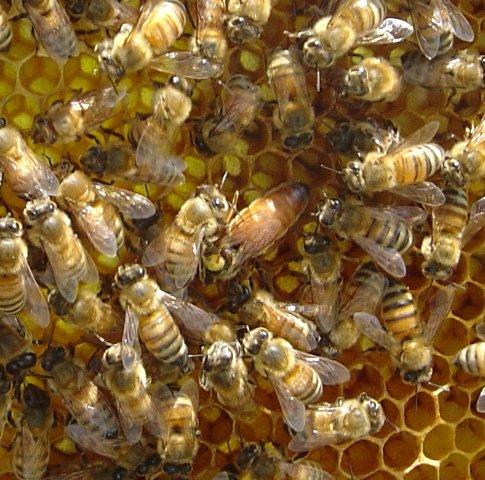A swarm of bees in June is worth a silver spoon.
A swarm of bees in July ain’t worth a fly."
This is an old beekeepers saying. Apparently in the 1700’s a load of hay was worth mor
 e than a silver spoon!
e than a silver spoon!.
Michael near a swarm of bees we had in 2002
.
The saying means that if you capture a swarm of bees in May, chances are that they will produce enough honey to survive the winter, and maybe some extra for you.
If you were to capture a swarm of bees in June, they would probably produce enough to survive the winter.
If you captured a swarm of bees in July, chances were that they would not have enough time to produce enough numbers, comb, and honey stores to survive the winter.
The main honey flow is on here on Cape Cod. Our honey flow starts the end of May and continues to the start of August. That gives the bees two months to produce enough honey to keep them and me happy through the winter months.
There is a small honey flow in the fall of most years, but I allow them to keep that honey for themselves.

All of the hives were inspected over the long holiday weekend. There were no swarm cells (queen cells) found in the hives. Honey supers (boxes) were added to the strong colonies that will need more space to expand into.
.
With any luck next week’s inspections will show signs of nectar storage in these boxes.
.
A closer look at the 2002 swarm
.
I place a ross round honey comb super on each of my strong hives. These are always a favorite at our local fair and sell out quickly.
.
The weather has been beautiful here on the cape this week. Low 80’s with no humidity! Of course you know the saying on Cape Cod.
“If you don’t like the weather…. Just wait a minute”
Yesterday I received a call from an fellow beekeeper in a neighboring town. Apparently his one hive swarmed. He had started the hive last year, and added his honey supers early thinking this would be enough to keep them. Unfortunately for the next month second and third year hives need to be intensely managed in order to insure that swarming preparations are not begun by the bees. It is their natural tendency to reproduce, and swarming is the process through which a hive of bees reproduces.
 The bees will decide to produce one or more queens. Once the queen cells are capped, half the hive along with the old queen leave the colony and find a new home.
The bees will decide to produce one or more queens. Once the queen cells are capped, half the hive along with the old queen leave the colony and find a new home..
A ross round honey comb super ready to be placed on the hive
.
It is quite the amazing thing to see. Tens of thousands of bees run out of the hive and take flight in a cyclone of activity. It is like being in a dirt devil of bees. Unfortunately for the beekeeper, he has just lost his honey producing work force, and the existing hive is left with an unpredictable future. If all goes well a new virgin queen will emerge within a weeks time.
.
Then within another 7 days she will take several mating flights, and if she is successful or does not get eaten by a bird, or does not get lost, in another few days she will start laying eggs again.
.
The end result is a loss of ten thousand worker bees, the old queen, a months worth of egg production, and this years honey crop. It will take the bees the rest of the summer to replace what it has lost.
.
.
With that said… Watch your bees carefully this time of year, you can rest in the winter








No comments:
Post a Comment